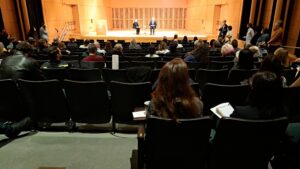When I arrived as a visiting ARC fellow to the Graduate Center at CUNY, New York a few weeks ago, I was told that the common dining room at the 8th floor had fallen out of use. There used to be a kitchen, with people serving warm, affordable food. It used to be a place where graduate students and staff came together to have lunch, to socialize, and exchange ideas. However, with the COVID-pandemic, buildings were closed or extremely moderately staffed, and the exploitation of a kitchen was not economically viable. To compensate, the management decided to install two vending machines, selling snacks and sodas.
Now that most students and staff are back at their offices, they find this a real miss, or, put more strongly, some experience this as a violation of their basic needs. For many of them, particularly the students, the cafeteria used to serve as their way of getting at least one hot meal per day for a reasonable price. Sure, one could argue, the Graduate Center is located in the heart of New York, literally next to the Empire State Building! There are plenty of venues in the near vicinity to pick up or order a meal. However, many of the graduate students have an income that equals half a living wage, and some of them have to support children, or send remittances back home. Moreover, apart from cheap food, the graduate center staff and students are also missing a common place to get together, discuss the weather, academic debates, or world politics.
So, a number of graduate students launched an initiative, starting on a late Wednesday afternoon early February, to come to the common room and have a potluck. Everybody who was interested, students, grad students, and staff, could bring (healthy) food, and donations for sustaining a communal provision of food. Of course, the management took issue with this spontaneous food pantry, and argued that it was against hygienic protocols etc. etc. There apparently even was a small row when the pantry was approached by officials representing the board, and food was thrown away. Students now express that they have “no confidence” in the current management.
Today, there was a meeting with two members of the board, where about 100 students and staff were present, many of whom raised their concerns. I attended the meeting and was fascinated by the contrast between the formal, bureaucratic language of the management (including, how conveniently, announcements of further budget cuts which are imposed from above) and the concerned, communal, and sometimes slightly combative contributions of the students and staff. Obviously, this fight is not merely about food. It is about much bigger issues, such as poverty and inequality within academia, about governance that should be more transparent and benevolent, and, ultimately, about the excesses of the neoliberal system that is mainly about costs and benefits, instead of what most academics want it to be about: dedication, community and mutual care.

Then I started thinking about my own university. For sure, neoliberalism hasn’t penetrated academia in the Netherlands as pervasively as in the United States. However, if we again zoom in on food, our university catering has been outsourced for many years. Just before the pandemic, our close-by cafeteria at the University Library was closed – not because too few people visited (the place was always packed) but because it was no longer financially viable. All that is left is a coffee bar with overpriced coffee and some snacks and cookies. Our economic and social history group, which always used to have common lunches there, have been struggling ever since. Not necessarily because the food was that great (or even cheap), but because we lost a proper place to have lunches and see our colleagues every day, in order to have personal conversations or talk about work.
Ever since – which now is over three years – we have been asking our management for a place to convene for lunch, and while they are sympathetic and understanding to our wishes, they haven’t provided us with an alternative yet. Practical as we are, we try to have lunch as often as possible in a meeting room (if it is free) with food that we brought from home or bought at a local store or café. Perhaps our situation is not as political, nor as unequal, as the situation in the US. For one thing, our PhD students get a proper salary, which is above living wage, and includes secondary employment benefits. But over the past few decades, there have been recurrent discussions about whether this PhD salary should be maintained, recently resurfacing again. Perhaps we should learn from the US experience that we do not want to go there. Education and independent research are public goods, which should not revolve around costs and benefits in terms of monetary value. What we have to offer society are insights and skills that help us understand and improve the world we live in.
Preferably, though, with a full stomach and in connection with our communities.